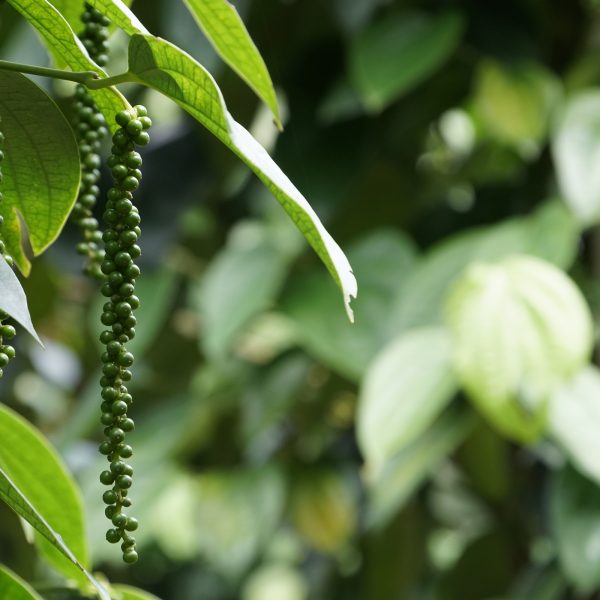-
How does it feel?
Nutmeg is the seed of an evergreen tree native to the Banda islands in the Spice Islands of Indonesia; it is now cultivated in tropical climates across the globe. Myristica fragrans is the latin for the most important commercial tree species to produce the nutmeg seed. The trees can grow to heights of up to 25 feet. Nutmegs are egg shaped and 2-5cm in diameter. The inside of the seed is a creamy white with characteristic dark brown veins running throughout. It is these dark veins that carry the essential oils which give this spice its distinctive taste and smell. It is the kernel of the fruit that is the ‘nutmeg’; the outer seed coating is classed as a completely separate spice known as ‘mace’. The two are separated after collection, whereby the kernel, or ‘nutmeg’ is left to dry before being ground into a powder.
-
What can I use it for?
Nutmeg is packed with pungent essential oils, primarily myristicin. Myristicin is a stimulant to the gastrointestinal tract, where its pungency can help to clear pain and discomfort associated with bloating and indigestion. These volatile oils are also effective anti-inflammatories that encourage a healthy inflammation response within the digestive tract and also the nervous system.
Nutmeg contains anti-spasmodic portions that relax agitation specifically within the nervous system, calming irritation and anxiety but also tension that may be affecting the functioning of the urinary and reproductive system.
-
Into the heart of nutmeg
 Nutmeg is fantastically calming and soothing to a frayed and tense nervous system. It helps to relax whilst also tonify and restore its strength. It is particularly suited to those with excessive agitation, excitation or hyper-activity that is affecting sleeping patterns and concentration. The pungent essential oils also help to stimulate the blood flow to the brain and improve overall clarity and ‘peace of mind’. Nutmeg will help to relax but also tonify a weakened nervous system, making it effective where anxiety or tension has reduced the efficiency of a particular body system.
Nutmeg is fantastically calming and soothing to a frayed and tense nervous system. It helps to relax whilst also tonify and restore its strength. It is particularly suited to those with excessive agitation, excitation or hyper-activity that is affecting sleeping patterns and concentration. The pungent essential oils also help to stimulate the blood flow to the brain and improve overall clarity and ‘peace of mind’. Nutmeg will help to relax but also tonify a weakened nervous system, making it effective where anxiety or tension has reduced the efficiency of a particular body system.Nutmeg is indicated in insomnia with waking in the night, agitated mind and lack of concentration. When there is excitation in the mind it draws the expansive nature inwards. It helps to relax the muscles and prevent pain associated with angina, fibromyalgia and arthritis.
Nutmeg helps absorption in the small intestine; its astringency draws nutrients into the bloodstream. It can help to stop diarrhoea and dysentery whilst also calming intestinal spasms, pain, gas and bloating. It is also a useful anthelmintic.
Indicated in male infertility, and premature ejaculation. It is considered a primary aphrodisiac. It also astringes a weak urinary flow and is used in prostatic disease and incontinence.
The hot and penetrating properties of nutmeg can help to clear excess mucous and congestion from the lungs.
-
Traditional actions
Herbal actions describe therapeutic changes that occur in the body in response to taking a herb. These actions are used to express how a herb physiologically influences cells, tissues, organs or systems. Clinical observations are traditionally what have defined these actions: an increase in urine output, diuretic; improved wound healing, vulnerary; or a reduction in fever, antipyretic. These descriptors too have become a means to group herbs by their effects on the body — herbs with a nervine action have become the nervines, herbs with a bitter action are the bitters. Recognising herbs as members of these groups provides a preliminary familiarity with their mechanisms from which to then develop an understanding of their affinities and nuance and discern their clinical significance.
Ayurvedic actions
-
Traditional energetic actions
Herbal energetics are the descriptions Herbalists have given to plants, mushrooms, lichens, foods, and some minerals based on the direct experience of how they taste, feel, and work in the body. All traditional health systems use these principles to explain how the environment we live in and absorb, impacts our health. Find out more about traditional energetic actions in our article “An introduction to herbal energetics“.
Chinese energetics
Western energetics
-
Did you know?
The tree that produces the nutmeg, does not bloom or produce fruit for the first 7-9 years of its life and the tree will not reach its full production potential for another 20 years.
Additional information
-
Safety
No drug herb interactions are known but caution with sedative, anti-hypertensive and anti-depressant medication.
-
Dosage
0.5–6g/day or 1–6ml of a 1:3 in 45% tincture

























 Nutmeg is fantastically calming and soothing to a frayed and tense nervous system. It helps to relax whilst also tonify and restore its strength. It is particularly suited to those with excessive agitation, excitation or hyper-activity that is affecting sleeping patterns and concentration. The pungent essential oils also help to stimulate the blood flow to the brain and improve overall clarity and ‘peace of mind’. Nutmeg will help to relax but also tonify a weakened nervous system, making it effective where anxiety or tension has reduced the efficiency of a particular body system.
Nutmeg is fantastically calming and soothing to a frayed and tense nervous system. It helps to relax whilst also tonify and restore its strength. It is particularly suited to those with excessive agitation, excitation or hyper-activity that is affecting sleeping patterns and concentration. The pungent essential oils also help to stimulate the blood flow to the brain and improve overall clarity and ‘peace of mind’. Nutmeg will help to relax but also tonify a weakened nervous system, making it effective where anxiety or tension has reduced the efficiency of a particular body system.




